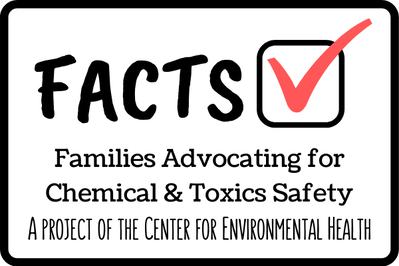Toxics-Free Living Resources
|
Now that you've got the FACTS, what do you do about it? There are many things we can do everyday to prevent or reduce our family's exposure to toxics. Many of these things have to do with our consumer choices and daily-living behaviors. The food we eat, water we drink, and things we put on and around our bodies really do make a difference in our exposure levels and health outcomes. Change is not always easy, but change can happen.
|
A TOXICS-FREE HOME IS A HEALTHY HOME
There are over 84,000 chemicals in commerce in the United States, 15,000 of which are used in high volume. Only 200 of these have been tested for safety and only 5 banned due to toxicity. Many of these chemicals used in everyday items are toxic and contribute to significant health outcomes. Unfortunately, many toxics are commonly found in our home environments and are brought into our homes through our consumer activities and exposure.
Our homes are our sacred spaces. Ideally, we experience a deep sense of safety and connection to loved ones within our homes. We all deserve to be safe in our homes. We recognize that busy families may not have the time to do the toxics and consumer research, so we've done it for you!
There are over 84,000 chemicals in commerce in the United States, 15,000 of which are used in high volume. Only 200 of these have been tested for safety and only 5 banned due to toxicity. Many of these chemicals used in everyday items are toxic and contribute to significant health outcomes. Unfortunately, many toxics are commonly found in our home environments and are brought into our homes through our consumer activities and exposure.
Our homes are our sacred spaces. Ideally, we experience a deep sense of safety and connection to loved ones within our homes. We all deserve to be safe in our homes. We recognize that busy families may not have the time to do the toxics and consumer research, so we've done it for you!
HEALTHY HOMES, HEALTHY FAMILIES: BEST PRACTICES FOR TOXICS-FREE LIVING
HERE'S A BROCHURE-STYLE CHECKLIST OF THINGS YOU CAN DO TO REDUCE TOXICS IN YOUR HOME:
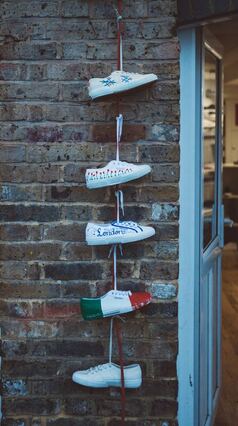
MAIN LIVING AREA
- Take off shoes when entering home
- Vacuum (HEPPA preferred) and mop frequently
- Choose furniture and carpets/rugs that do not contain flame retardants or stain guards
- Choose wood, bamboo, cork, or phthalate-free vinyl flooring
- Choose VOC-free or low-VOC paint products and building materials
- Discontinue use of air fresheners (sprays, plug-ins, scented candles). Choose aromatherapeutic essential oils or beeswax candles
- Replace chemical cleaning products with safer options or DIY products like vinegar and water
- Choose untreated solid wood furniture instead of items made with particle board or vinyl
- Choose organic soil and plant fertilizers for potted indoor plants
- Implement a Non-Toxic Pest Management approach; stop using and properly dispose of synthetic insecticides, pesticides, and rodenticides
- Use pheromone traps instead of mothballs
- Use rodent traps instead of poisons
- Use bait traps for insect infestations
- Frequently open windows and doors if the outside air is safe (airnow.gov)
- Use an ozone-free HEPA air purifier indoors (or focus on sleep areas)
- Eliminate exposure to smoke (tobacco, wood, and cooking fumes)
- Use a landline and corded telephone and minimize cell phone use
- Turn wi-fi router off when not in use and at night when sleeping or hardwire your home
- Install a carbon-monoxide detector
- Properly handle and dispose of compact fluorescent light bulbs (especially when broken)
- Eliminate mold/mildew sprays (these contain chlorine)
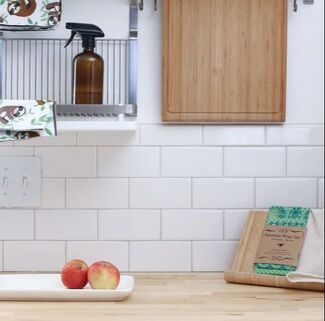
KITCHEN & DINING AREAS
- Breast feed your baby if you can; use organic formula and filtered water when unable to breast feed (be sure water is lead free)
- Choose organic, local food whenever possible
- If organic is unavailable or too expensive, avoid GMOs and foods on EWG’s Dirty Dozen List https://www.ewg.org/foodnews/dirty-dozen.php
- Eat from the Clean Fifteen List https://www.ewg.org/foodnews/clean-fifteen.php
- Choose healthy and sustainably farmed/harvested fish, cage-free, free-range, and sustainably farmed eggs and meats
- Avoid canned food and beverages
- Choose sea salt or iodized salt
- Buy in bulk and steer clear of products with a lot of plastic packaging, such as individually wrapped items
- Avoid microwave popcorn, brown rice syrup, artificial sweeteners, corn syrup, high fructose corn syrup, preservatives, artificial colors and flavors
- Choose organic rice grown in the USA (soak rice)
- Test water quality and choose a filter that best meets your needs https://www.ewg.org/tapwater/
- Use a water filter for drinking tap water
- Opt out of buying single-use, recyclable plastic bottled water
- Use refillable glass or stainless steel water bottles
- Discontinue use of non-stick cookware and replace with cast iron or ceramic
- Replace all chemical cleaning products with all-natural, all-purpose cleaning solutions or DIY
- Cook on the farthest back burners
- To clean windows, laminate floors use vinegar and water (can add essential oils if tolerated)
- Use baking soda or salt as a natural cleaning abrasive
- To clean oven and stove: use baking soda on difficultto- clean areas, spray oven with vinegar, let sit 10 minutes then wipe clean (vinegar infused with lemon and orange peels is especially effective at cutting grease)
- Replace chemical drain cleaners with natural cleaning practices and products
- Use strainers in your sink to catch food and particles that might clog the drain; dispose of fat, oil, and grease in the garbage, not down the drain with hot water
- Use hot soapy water, salt and hot water, or, if that doesn’t work, a biological enzyme to unclog fat and oil
- Use a plunger to unclog food stuck in curved pipes
- Replace mercury thermometer with digital. Safely dispose of all mercury products.
- Be sure your tableware (cups, plates, bowels, etc.) and cookware (baking & microwaveable dishes) do not contain lead
- Use the up or down-draft on the stove or open a nearby window when cooking to keep fresh air circulating and reduce exposure to chemical by-products from cooking
- Reheat food on the stovetop or oven
- Minimize use of microwave for cooking/reheating food and beverages; only microwave in glass (leadfree)
- Do not cook, bake, or microwave food/beverages in any plastic product (containers, plastic wrap, etc.), even those labelled “microwave safe” may leach chemicals into food/beverages
- Reduce and eliminate plastics, especially avoid plastics with the recycle symbols #3, #6, & #7
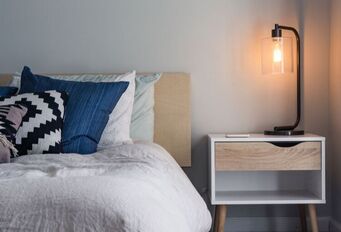
BEDROOMS/NURSERY AREAS
- Choose mattresses made from natural materials like organic wool, 100% latex, organic cotton, and avoid metal coils
- Choose bedding made from bamboo, silk, linen, wool, organic cotton, hemp, or cashmere
- Avoid flame-retardants and stain guard treatments
- Choose mattress covers made from safer plastics (polypropylene) and avoid vinyl, other PVC materials
- Choose untreated solid wood furniture instead of particle board, plywood, or metal
- Clean surfaces with all-natural cleaner and avoid mold/mildew sprays
- Wash bedding with all-natural laundry products; always wash new bedding before use
- Eliminate chlorine bleach, stain remover treatments, detergents with fragrance, fabric softeners, and dryer sheets
- Remove wi-fi routers and cordless phones
- Turn cell phone off or on airplane mode when sleeping and avoid sleeping with cell phones near head or body
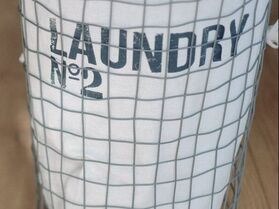
CLOTHING & LAUNDRY
- Choose natural and sustainably-made clothing from natural fibers: cotton, silk, bamboo, hemp, wool, linen, and cashmere
- Avoid synthetic fibers: polyester, acrylic, rayon, nylon, acetate and triacetate
- Avoid clothing that is static resistant, stain-resistant, permanent press, wrinkle-free, and water-proof
- Choose used clothing when appropriate
- Wash all new items before use
- Choose all-natural laundry products and avoid detergents with sudsing agents like sodium laureth sulfate
- Discontinue use of chlorine bleach
- Use hydrogen peroxide to whiten laundry
- Opt out of using softeners and dryer sheets
- Opt out of dry-cleaning systems that use perchloroethylene (PERC) and choose organic/ green dry cleaners

PLAY SPACES
- Apply recommendations from Main Living Area
- Wash/wipe hands frequently
- Choose items that do not have flame retardants or stain guards - mattresses and nap mats; swings, rockers, and bouncers; car seats; play yards (often made of vinyl)
- Use washable cloth diapers and wipes if possible
- When purchasing single-use diapers and wipes, choose chlorine-free, fragrance-free, dye-free and made from renewable, biodegradable materials
- Eliminate use of baby powder and petroleum-based products like petroleum jelly and baby oil
- Avoid all products labelled anti-bacterial: wipes, foam sanitizers, soap
- Eliminate alcohol-based hand sanitizers
- Replace all chemical cleaning products with all natural, all-purpose cleaning solution or DIY vinegar and water
- Remove wi-fi routers and cordless phones from area
- Hard-wire ipads and other hand-held devices and turn off antennas (airplane mode + location services off)
- Choose toys made with natural materials such as solid wood (unfinished or with a non-toxic finish), hemp, organic cotton, wool, natural rubber, or safer plastics
- Choose PVC-free and BPA-free products (typically squishy or flexible plastics like rubber duckies and baby dolls contain PVC)
- Eliminate plastics labelled #3, #7 or with a “V” inside the chasing arrows symbol
- Avoid toys with wi-fi components like bluetooth
- Avoid cheap toys, pacifiers, teething rings, children’s jewelry, tea sets and make-up made in China and sold at discount stores (typically dollar items)
- Be careful with used children’s toys made before 2009 in the US or 2006 in Europe
- Use caution when choosing used toys
- Dispose of toys with chipped paint
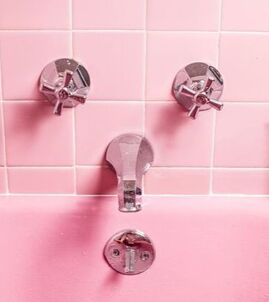
BATHROOM
- Eliminate use of air fresheners and fragrances
- Replace chemical cleaning products with vinegar and water (use baking soda or salt as a natural cleaning abrasive for the shower, tub, and toilet)
- Choose toothpastes that are free of whiteners, microbead scrubbers, and avoid ingesting fluoride.
- Avoid anti-bacterial soaps
- Choose all-natural soaps free from sodium laureth sulfate and other foaming agents, parabens, phlthalates, and fragrance
- Opt out of products with micro-beads
- Choose mineral/sea salts instead of liquid bubble baths
- Check for cleaners for safety at EWG’s Guide to Healthy Cleaning www.ewg.org/guides/cleaners
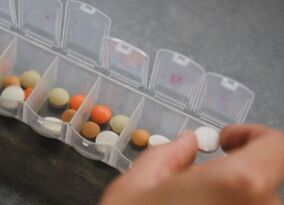
PERSONAL CARE
- Properly store prescriptions and over-the-counter medications in a safe place out of reach of children
- Properly dispose of prescriptions /medications and do not put them down the drain or toilet
- Prescription/Medication take-back locations: http://www.safemedicinedisposal.org/drop-off-locations/
- Be an informed consumer regarding anything you put on or in your body. For product recommendations for shampoos, conditioners, toothpastes, sunscreens, cosmetics, etc., go to EWG’s Skin Deep Database https://www.ewg.org/skindeep/#.WsvzD62ZO9Y

PETS
- Choose non-toxic flea and tick control - no flea collars or topical treatments
- Flea and tick shampoos often contain the same toxic ingredients as topical treatments, so choose all-natural products for pets too
- Groom pets regularly with a fine-tooth comb
- Wash pet bedding regularly in hot, soapy water
- Regularly vacuum and wipe down pet-frequented areas
- For flea infestations, use soap and water to kill adult fleas, do the above daily and steam clean carpet (choose green-cleaning company + products or buy a steam cleaner)
- Use diatomaceous earth around the house to prevent flea infestations
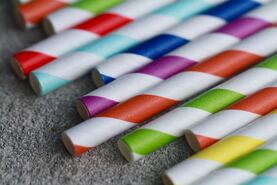
OUT & ABOUT IN THE COMMUNITY
- Wash hands frequently (use all natural baby wipes when needed)
- Bring your own cup for to-go beverages (hot and cold)
- Bring your own food and snacks in reusable containers/bags and avoid eating fast foods
- Bring your own reusable shopping bags and avoid using plastic bags
- Avoid using plastic straws

AUTOMOBILE
- Change air filters regularly
- Avoid air fresheners & chemical cleaners




